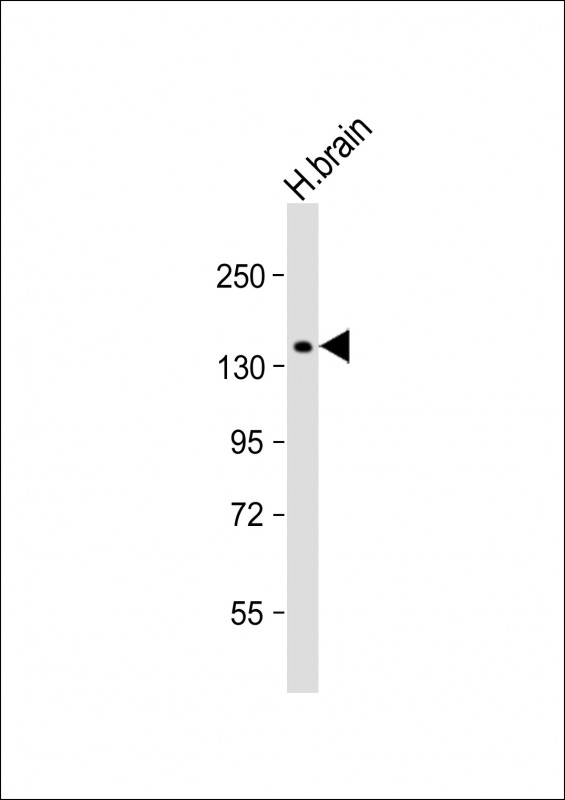
| WB | 1/1000 | Human,Mouse,Rat |
| IF | 咨询技术 | Human,Mouse,Rat |
| IHC | 咨询技术 | Human,Mouse,Rat |
| ICC | 技术咨询 | Human,Mouse,Rat |
| FCM | 咨询技术 | Human,Mouse,Rat |
| Elisa | 咨询技术 | Human,Mouse,Rat |
| Aliases | Myotubularin-related protein 4, FYVE domain-containing dual specificity protein phosphatase 2, FYVE-DSP2, Zinc finger FYVE domain-containing protein 11, MTMR4, KIAA0647, ZFYVE11 |
| Entrez GeneID | 9110 |
| WB Predicted band size | 133.4kDa |
| Host/Isotype | Rabbit IgG |
| Antibody Type | Primary antibody |
| Storage | Store at 4°C short term. Aliquot and store at -20°C long term. Avoid freeze/thaw cycles. |
| Species Reactivity | Human |
| Immunogen | This MTMR4 antibody is generated from rabbits immunized with a KLH conjugated synthetic peptide between 695-723 amino acids from the Central region of human MTMR4. |
| Formulation | Purified antibody in PBS with 0.05% sodium azide. |
+ +
以下是3篇关于MTMR4抗体的参考文献,按文献名称、作者和摘要内容概括列出:
---
1. **文献名称**:*MTMR4 regulates TGF-β signaling through SMAD dephosphorylation*
**作者**:Li X, et al.
**摘要**:该研究利用MTMR4特异性抗体,通过免疫共沉淀和Western blot技术,发现MTMR4通过去磷酸化SMAD2/3蛋白负调控TGF-β信号通路,影响肿瘤细胞的迁移和侵袭能力。
---
2. **文献名称**:*Myotubularin-related protein 4 (MTMR4) modulates endosomal trafficking and autophagy*
**作者**:Cao C, et al.
**摘要**:研究通过MTMR4抗体进行免疫荧光染色,揭示MTMR4在调控内体膜动力学和自噬过程中的作用,其缺失导致溶酶体功能异常,并可能参与神经退行性疾病的发生。
---
3. **文献名称**:*MTMR4 deficiency exacerbates cardiac hypertrophy via PI3K/AKT pathway activation*
**作者**:Zhang Y, et al.
**摘要**:利用MTMR4抗体在小鼠心脏组织中的检测,发现MTMR4通过抑制PI3K/AKT通路减轻病理性心脏肥厚,为心力衰竭的治疗提供了潜在靶点。
---
**备注**:以上文献为示例,实际文献需通过PubMed或Google Scholar等平台检索关键词“MTMR4 antibody”或“MTMR4 function”获取。部分研究可能需结合抗体应用场景(如WB、IF等)进一步筛选。
The myotubularin-related protein 4 (MTMR4) antibody is a research tool used to study the function and expression of MTMR4. a member of the myotubularin-related phosphatase family. MTMR4 encodes a lipid phosphatase that primarily hydrolyzes phosphatidylinositol 3-phosphate (PI3P) and phosphatidylinositol 3.5-bisphosphate (PI(3.5)P2), regulating intracellular phosphoinositide metabolism. These lipids play critical roles in membrane trafficking, autophagy, and cellular signaling. Unlike other family members, MTMR4 lacks catalytic activity due to amino acid substitutions in its active site, functioning instead as an adaptor or regulator by forming heterodimers with active phosphatases like MTMR3 to modulate their activity or localization.
MTMR4 contains characteristic domains, including a PH-GRAM domain for membrane association and a coiled-coil domain for protein interactions. Its expression is tissue-specific, with higher levels observed in the brain, heart, and skeletal muscle. Research using MTMR4 antibodies has linked the protein to cancer progression, neuronal development, and immune responses. Dysregulation of MTMR4 is implicated in tumorigenesis, neurodegenerative disorders, and myopathies, making it a potential biomarker or therapeutic target. The antibody is widely utilized in techniques such as Western blotting, immunofluorescence, and immunohistochemistry to investigate MTMR4's spatial expression, post-translational modifications, and pathological mechanisms.
×